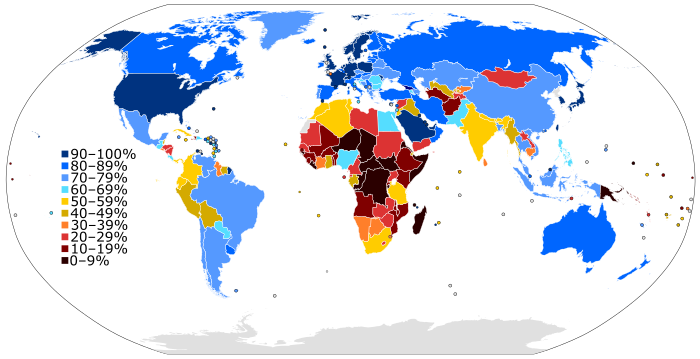
We might think we are in the digital age. Our lives in the West are so intertwined with being online, it seems like the offline age was in the distant past. However, it is shocking to discover that 40% of the world’s population is offline. That’s 3.7 billion people across the world who remain unconnected to the rest of us. A deeper dive into this topic shows us that we are not living in the world we think we live in.
Digital Natives Versus Digital Immigrants
I am a digital native, meaning I was born into a world with technology. Observing older generations has shown me that younger people often underestimate the skill level we possess with technology. It might seem intuitive to us, and I struggle to understand this at times, but using technology is a skill that must be learned, it’s not possible to acquire it passively.
It is similar to learning a new language. As a child, one passively absorbs the languages and one becomes incrementally better at it. Slowly and because we learnt it incrementally the next step also seems easier. However, imagine how much you’d struggle if you would be thrown into a foreign country. This is the same for Digital Immigrants there is just to much to learn so it seems so daunting.
When older generations were asked about their lack of digital skills, they mentioned fear and anxiety toward digital services, a negative attitude, feeling too old to learn, lack of knowledge, and difficulties understanding digital terminology. The only way I see this changing is by providing emotional and cognitive support to help elderly individuals further develop their skills.
It’s important to distinguish between two things: access to the internet and the ability to navigate it. Marginalised population groups like refugees might have internet access, but language barriers pose a significant hurdle. How can we expect refugees to integrate successfully without a proper understanding of a major cornerstone of Western society: digital literacy?
Additionally, minorities and women are other marginalized groups for whom the digital divide is exacerbated. During the COVID-19 pandemic, 11 million girls were at risk of not returning to the classroom due to a lack of digital resources.
What can be done?
When take a look at the world map above, we notice that most of the digital divide is in Africa. This is because in order to facilitate growth in internet users, there are a few things that need to be present. First of all there must be a good infrastructural base in order for people to access the internet. Secondly, there must be institutions which should instil digital skills.
It’s sad to see that inequality extends to the digital world as well. The amount of knowledge a person can access with the internet compared to without it is immense. When I reflect on my own experience, I taught myself guitar, coding, and languages—all through the internet. It’s hard to imagine a world, or even myself, without it.
References:
https://link.springer.com/article/10.1007/s10796-020-10096-3


Thank you so much for your blog, it has really broadened my perspective of the world! I really didn’t think that 40% of the world’s population would be offline. I had already realised that there would probably be a digital divide, but I didn’t expect it to be so drastic. An additional privilege I have that I should be more aware of now. Because I agree with you, I would be very unwilling to give up the most online functions.
But I’m also a bit of a romantic who likes to put away the digital devices and digital detox in nature for a while. But such phenomena of shifting offline are of course only temporary and the trend around them is probably based on this: the prospect of a “normal” everyday life in the digital world. I can therefore well imagine that if digital immigrants have not yet explored this “normal” everyday life in the digital world to any great extent, they will only look in disbelief at these digital natives who have the privilege of voluntarily deciding to shifting offline again.
It really is shocking to see that 40% of the worlds population is offline. The digital world has been a part of our lives for such a long time now that sometimes we might easily forget that parts of the world are not as integrated to it as we are. Really great blog, made me reflect on how we take such privileges for granted.
Wow, I never really thought about this in depth before. It’s so true that many of us, myself included, live in this Western bubble where being connected feels so normal that we take it for granted. I often underestimate how easy it is for me to download an app or navigate the internet, while my grandmother, for example, doesn’t understand any of it. It really highlights the privilege of digital literacy and access that I barely think twice about.
The comparison between non digital natives and immigrants makes so much sense, especially when I see how overwhelming it can be for older generations to adapt to this fast-paced digital world. It’s also shocking to realize how the digital divide disproportionately affects marginalized groups like refugees and women, especially in places with less infrastructure like parts of Africa. This inequality makes me reflect on how much I’ve gained from being online—like for me learning a new language and connecting with people online; and how inaccessible this would be without those digital resources. It’s definitely something we should all pay more attention to.